
Looking to boost your health in 2024? These top gadgets have you covered:
-
Apple Watch Series 9 ($399): Sleep apnea detection, ECG, 18-hour battery
-
Fitbit Charge 6 ($159.95): Heart rate tracking, 40 exercise modes, 7-day battery
-
Garmin Venu 3 ($450): 14-day battery, tracks 40 exercises, personalized morning report
-
Masimo W1 Medical Watch ($499): Hospital-grade tracking, FDA-cleared, 70,000 daily measurements
-
Oura Ring Gen 3 ($299-$549): Sleep tracking champ, 7-day battery, tracks 50+ health metrics
-
Whoop 4.0 ($20-30/month): Focuses on recovery and strain, no screen, 4-5 day battery
-
Blood Sugar Trackers: FreeStyle Libre 3 and Dexcom G7 lead in CGM tech
-
Health Tracking Rings: Oura, RingConn, Samsung, and Ultrahuman offer discreet options
Quick Comparison:
| Device | Battery Life | Key Feature | Price | | --- | --- | --- | --- | | Apple Watch Series 9 | 18 hours | Sleep apnea detection | $399 | | Fitbit Charge 6 | 7 days | 40 exercise modes | $159.95 | | Garmin Venu 3 | 14 days | Personalized reports | $450 | | Oura Ring Gen 3 | 7 days | Sleep tracking | $299-$549 | | Whoop 4.0 | 4-5 days | Recovery focus | $20-30/month |
Choose based on your needs: all-in-one (smartwatches), budget-friendly (fitness trackers), or discreet (smart rings). Remember, the best gadget is the one you'll actually use.
::: @iframe https://www.youtube-nocookie.com/embed/jrmidOO6LcM :::
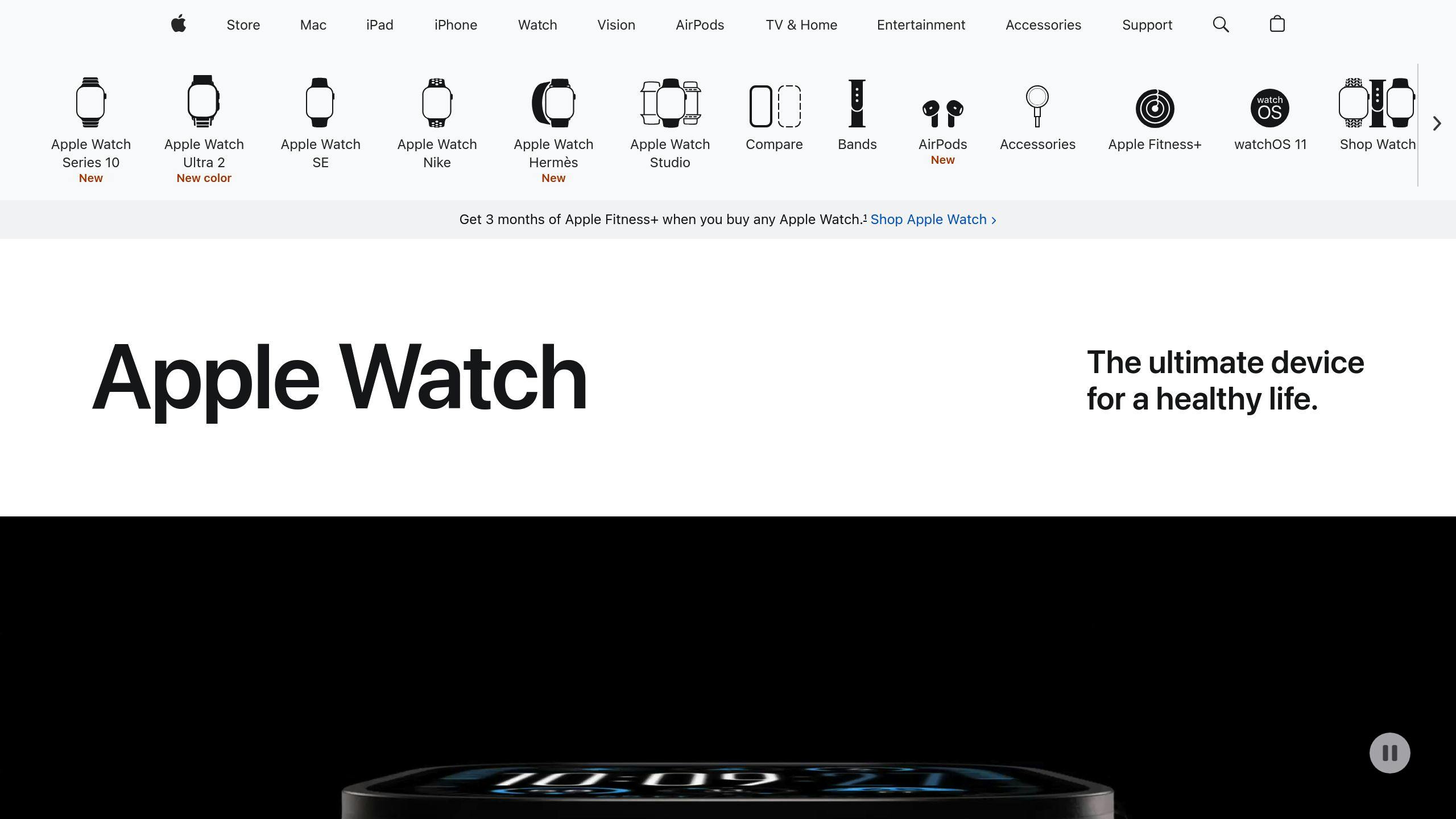
The Apple Watch Series 9 is shaking up the health tech scene. It's packed with features that put your wellness front and center. Let's break down what makes this smartwatch stand out in 2024.
Sleep Apnea Detection
The Series 9 has a new trick up its sleeve: spotting signs of sleep apnea. It uses something called Breathing Disturbances to flag potential issues. This is a big deal, considering sleep apnea affects over 1 billion people worldwide.
You can check your nightly Breathing Disturbances data in the Health app. It'll tell you if it's elevated or not, over different time periods. The FDA is expected to give this feature the green light soon, making it available in more than 150 countries.
"At Apple, we believe that technology can help you live a healthier life, and we're excited to enable incredible new health capabilities for serious conditions that affect billions of people around the world, while continuing to keep user data private." - Sumbul Desai, M.D., Apple's vice president of Health.
Health Tracking Galore
Sleep isn't the only thing the Series 9 keeps an eye on. It's got a whole toolkit for your health:
-
ECG App for heart rhythm checks
-
Cycle Tracking for menstrual health
-
Temperature Sensing for overall wellness
-
Fall Detection and Crash Detection for safety
Note: Blood Oxygen Level Monitoring has been removed from newer models due to patent issues.
Faster and Brighter
The new S9 chip gives the Series 9 a serious boost:
-
30% faster than the old S8 chip
-
Siri understands you 25% better
-
Screen is twice as bright (2,000 nits) for easy outdoor viewing
-
New double tap gesture for one-handed use
Battery Life and Price Tag
Even with all these fancy features, the Series 9 still lasts 18 hours on a charge. Switch to Low Power Mode, and you can stretch that to 36 hours. It'll set you back $399 for the GPS model or $499 if you want GPS and LTE.
Time to Upgrade?
If you're rocking an older Apple Watch (Series 6 or earlier), the Series 9 is a big step up. It's more accurate and way more powerful. Your old watch might start feeling a bit outdated in comparison.
| Feature | Apple Watch Series 8 | Apple Watch Series 9 | | --- | --- | --- | | Display Brightness | Up to 1,000 nits | Up to 2,000 nits | | Processor | Apple S8 | Apple S9 (30% faster) | | Storage | 32GB | 64GB | | Double Tap Controls | No | Yes |
The Apple Watch Series 9 is like having a health buddy on your wrist. It tracks your vitals, gives you useful insights, and might even save your life one day. Whether you're a fitness nut or just want to keep a closer eye on your health, the Series 9 has got you covered in 2024.
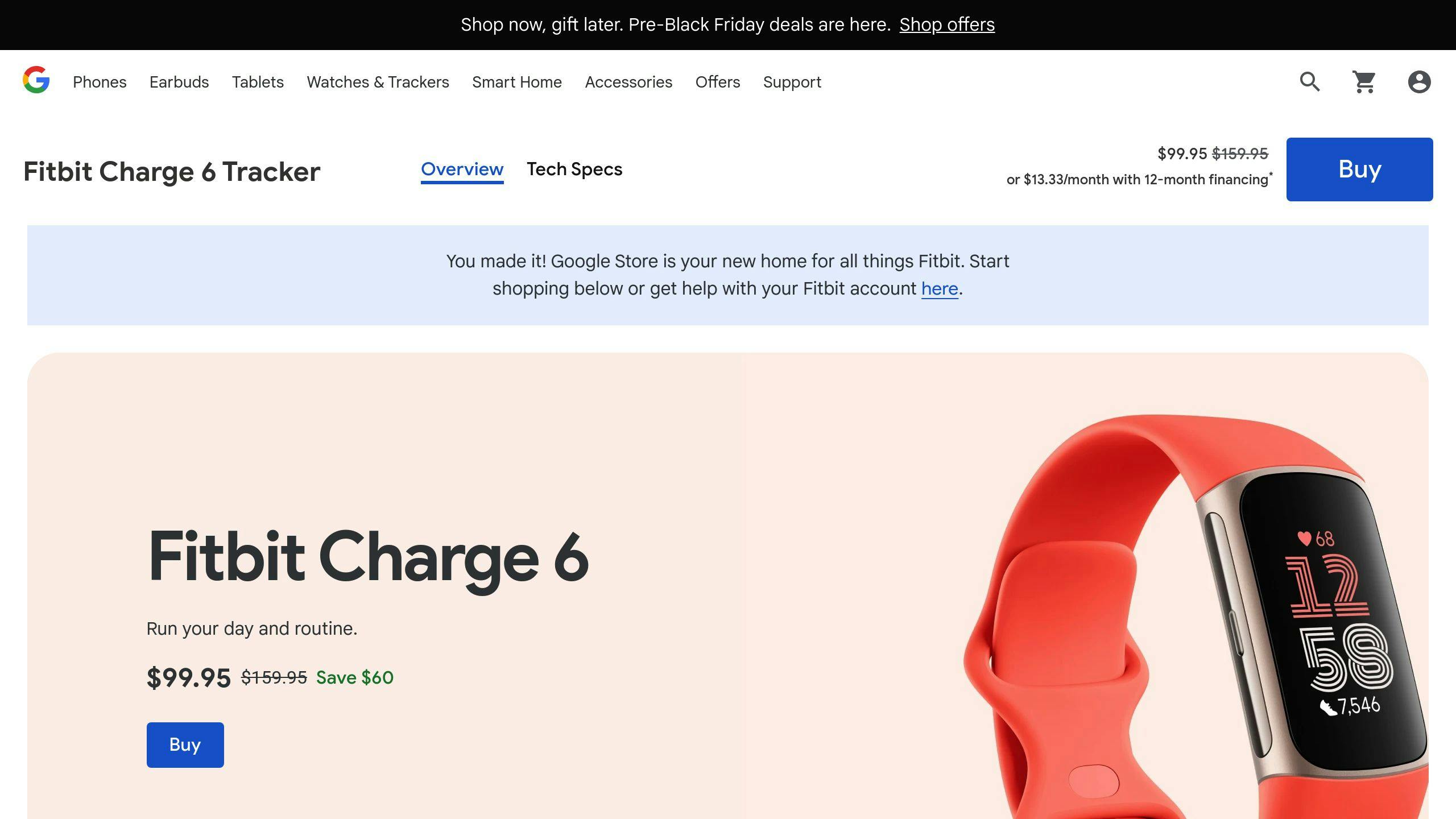
The Fitbit Charge 6 is shaking up the health gadget scene in 2024. At $159.95, it's a wallet-friendly powerhouse that packs a punch.
Heart Rate Tracking Leveled Up
The Charge 6 isn't messing around when it comes to heart rate tracking. Fitbit says it's 60% more accurate during intense workouts than the Charge 5. That's huge for fitness buffs who live and die by their heart rate stats.
"The affordable Fitbit Charge 6 remains the best fitness tracker on the market." - Angela Moscaritolo, Managing Editor, Consumer Electronics.
Workout Options Galore
This little gadget now tracks 40 different exercises. That's double what the last model could do. HIIT, CrossFit, skiing - you name it, the Charge 6 can track it.
Google Goodies
Fitbit's new Google overlords have thrown in some sweet extras:
-
Google Maps on your wrist
-
Google Wallet for tap-and-go payments
-
YouTube Music controls
It's like your Fitbit grew a brain overnight.
Long-Lasting and Slick
The Charge 6 keeps ticking for up to 7 days on a single charge. It looks just as sleek as the Charge 5, but now there's a physical button. No more fumbling with a touchscreen mid-workout.
Health Tracking Beyond Steps
This isn't your grandma's pedometer. The Charge 6 is loaded with sensors:
-
ECG for heart rhythm checks
-
EDA for stress levels
-
SpO2 for blood oxygen
-
Skin temperature sensor
Gym Buddy
Here's a cool trick: the Charge 6 can talk to gym equipment. Sync your heart rate to treadmills, rowers, and more. It's like your Fitbit and the gym equipment are best friends now.
Fitbit Premium Perks
Buy a Charge 6, and you get 6 months of Fitbit Premium free. This unlocks:
-
Daily Readiness Score
-
Deep dive into your sleep
-
Guided workouts and meditation
After the trial, it's $10 a month. Worth it if you're all-in on the Fitbit life.
The Fitbit Charge 6 is a top dog in the 2024 health gadget world. It's packed with features but won't break the bank. If you're looking to up your wellness game this year, the Charge 6 is worth a serious look.
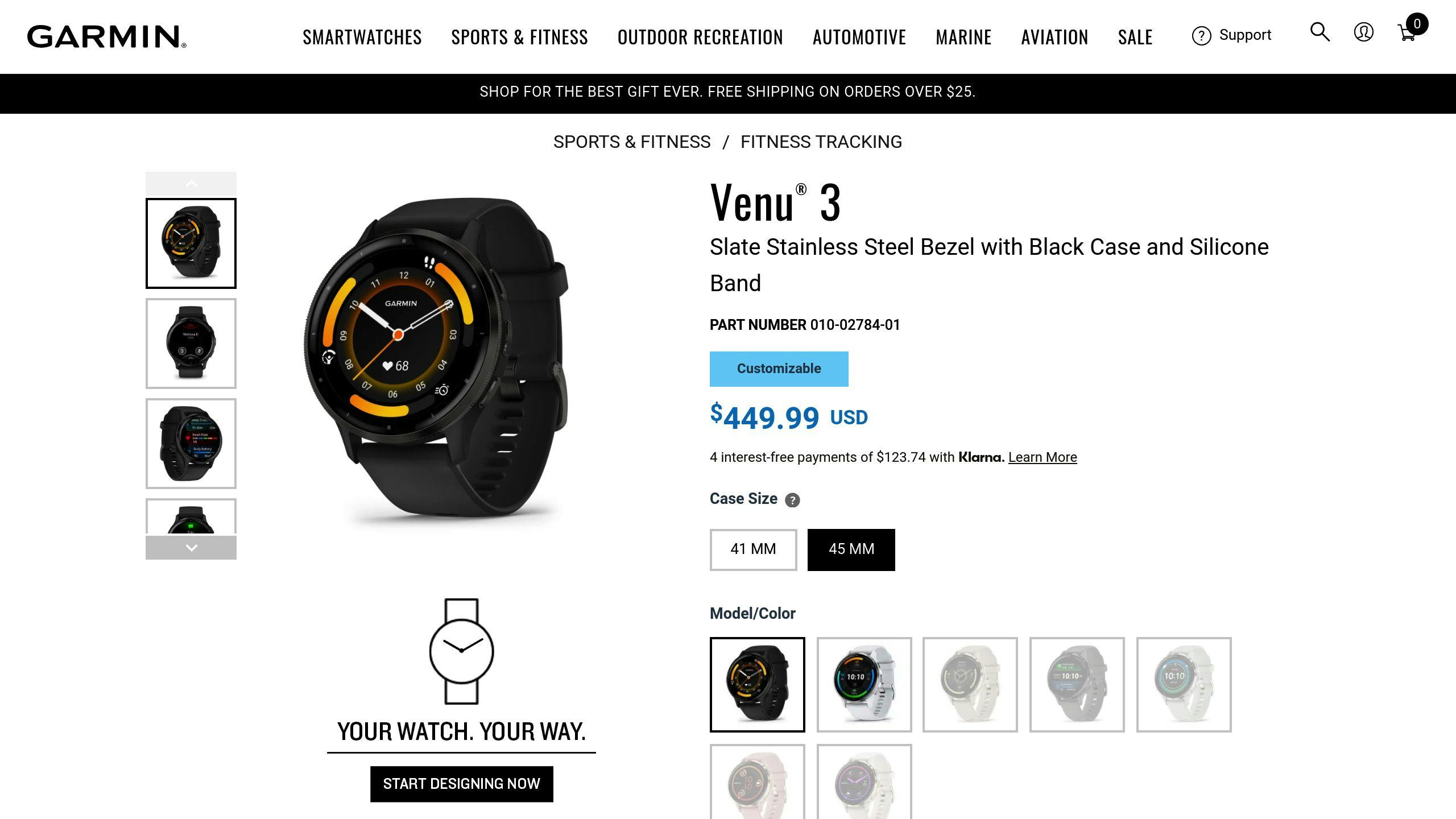
The Garmin Venu 3 is shaking up the health gadget world in 2024. It's not just another smartwatch - it's a fitness tracking powerhouse that won't die on you mid-workout.
Here's the deal: You get two size options (45mm Venu 3 and 41mm Venu 3S) for $450. But the real kicker? Battery life that'll make other smartwatches jealous.
We're talking up to 14 days in smartwatch mode. Even if you're crushing workouts daily, you're looking at about 5 days before needing a charge. No more nightly plug-ins or mid-day panic charges.
But what can this thing actually do? A lot:
-
Tracks heart rate, blood oxygen, ECG, skin temp, stress, and sleep (even naps!)
-
Monitors 40 different exercises (yes, even badminton and ice hockey)
-
Counts your reps during strength training (automatically!)
-
Gives you a daily "Body Battery" score (like an energy meter for your body)
Every morning, the Venu 3 serves up a personalized report. It breaks down your sleep, reminds you about meetings, and suggests workouts based on how you're doing. Had a rough night? It might nudge you towards yoga instead of a HIIT session.
"The Garmin Venu 3's stellar battery life and a wide variety of health tracking features make it stand out." - Lisa Eadicicco, CNET.
But it's not all sweat and stats. The Venu 3 packs some serious smartwatch chops:
-
Bright AMOLED display
-
Google Maps
-
Google Wallet for tap-and-go payments
-
Voice assistant
-
Music controls (including YouTube Music)
The best part? You don't need a PhD to use it. Garmin kept the interface simple, so you're not endlessly tapping through menus.
Bottom line: If you're looking to level up your health game in 2024, the Garmin Venu 3 is worth a serious look. It's the rare device that nails both fitness tracking AND smartwatch features, all while lasting longer than your last Netflix binge.
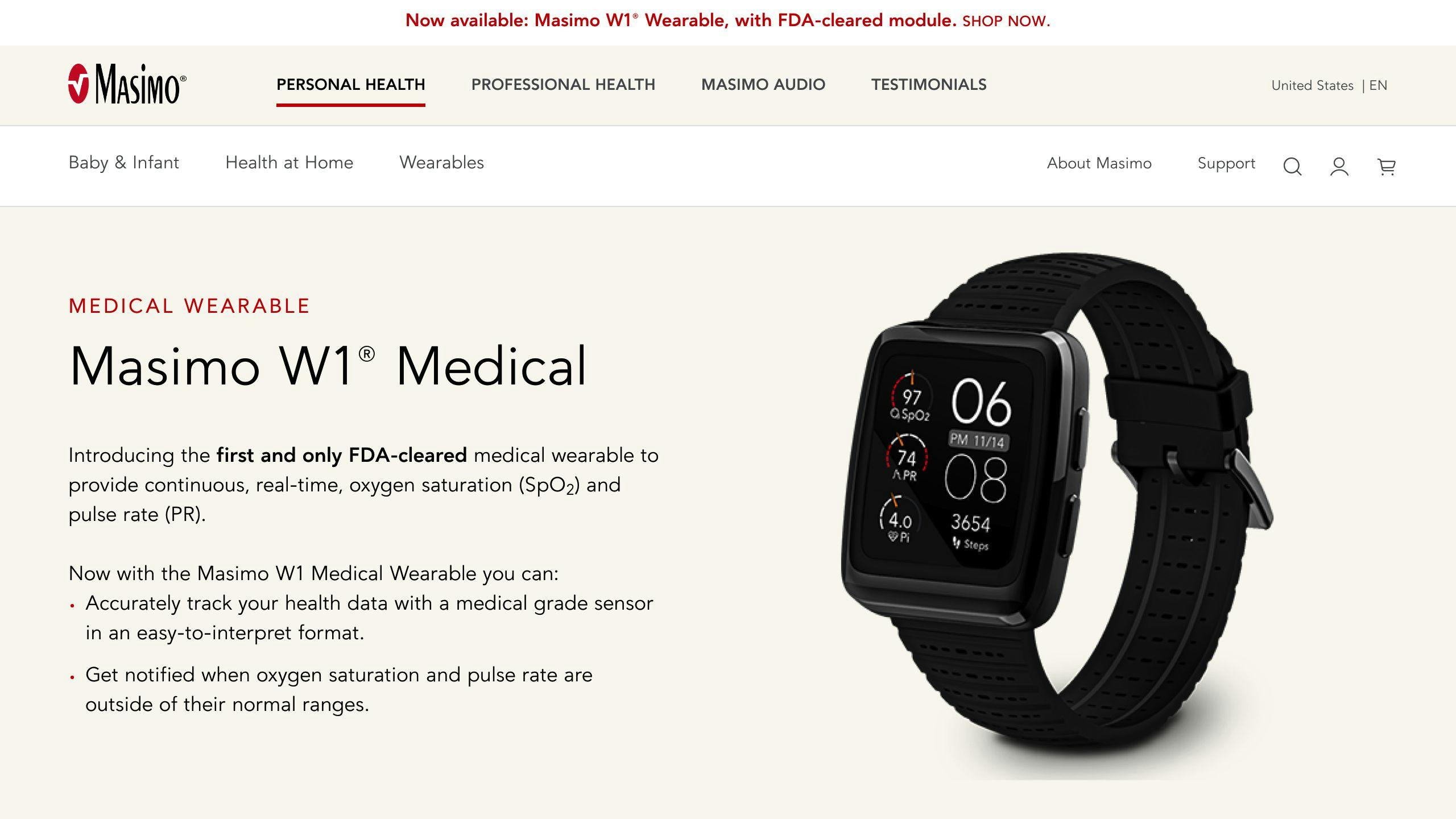
The Masimo W1 Medical Watch is turning heads in the 2024 health gadget market. It's not your run-of-the-mill smartwatch - this device packs hospital-grade tracking into a wrist-worn form.
What Makes It Special?
The W1 doesn't mess around when it comes to health monitoring. It tracks:
-
Oxygen levels
-
Heart rate
-
Breathing rate
-
A unique Hydration Index
It's like having a mini hospital monitor on your arm, constantly keeping tabs on your vitals.
"The SET® technology we invented for hospitals transformed patient monitoring, saved lives, and reduced the cost of care. Based on the feedback we have received from those who have tested Masimo W1 during the limited market release phase, we believe this watch will improve lives." - Joe Kiani, Masimo's CEO and Chairman.
Always On Duty
The W1 doesn't take breaks. It's recording a whopping 70,000 measurements every day. That's one reading per second, giving you a non-stop view of your health.
FDA Stamp of Approval
This isn't just another wellness gadget. The W1 is FDA-cleared for continuous oxygen and pulse rate monitoring, both over-the-counter and by prescription. That means it's good enough for hospitals, clinics, and your home.
Real-World Use
Healthcare pros are already putting the W1 to work. Cambridge University Hospitals in England use it to boost their Virtual Health program, helping patients feel more confident when they head home after a hospital stay. Over in Switzerland, the Department of Anesthesiology at CHUV in Lausanne uses the W1 to get a better picture of patients' health before surgery.
What's the Damage?
The Masimo W1 will set you back $499. That gets you the watch, wristband, charger, and a three-year warranty. Want more insights? You can sign up for monthly plans:
-
Basic membership: $7.99/month
-
Advanced membership: $18.99/month
These plans unlock extra features and dive deeper into your health data.
Is It Worth It?
If you need or want medical-grade health tracking, the Masimo W1 is worth a look. It's not just for fitness fanatics - it's for anyone managing chronic conditions, bouncing back from surgery, or just wanting to know more about their health.
Sure, it might not have all the fancy features of a typical smartwatch. But the W1 makes up for it with precision and non-stop monitoring that could be a game-changer for your health. If you're after a health gadget in 2024 that goes beyond counting steps, the Masimo W1 deserves your attention.
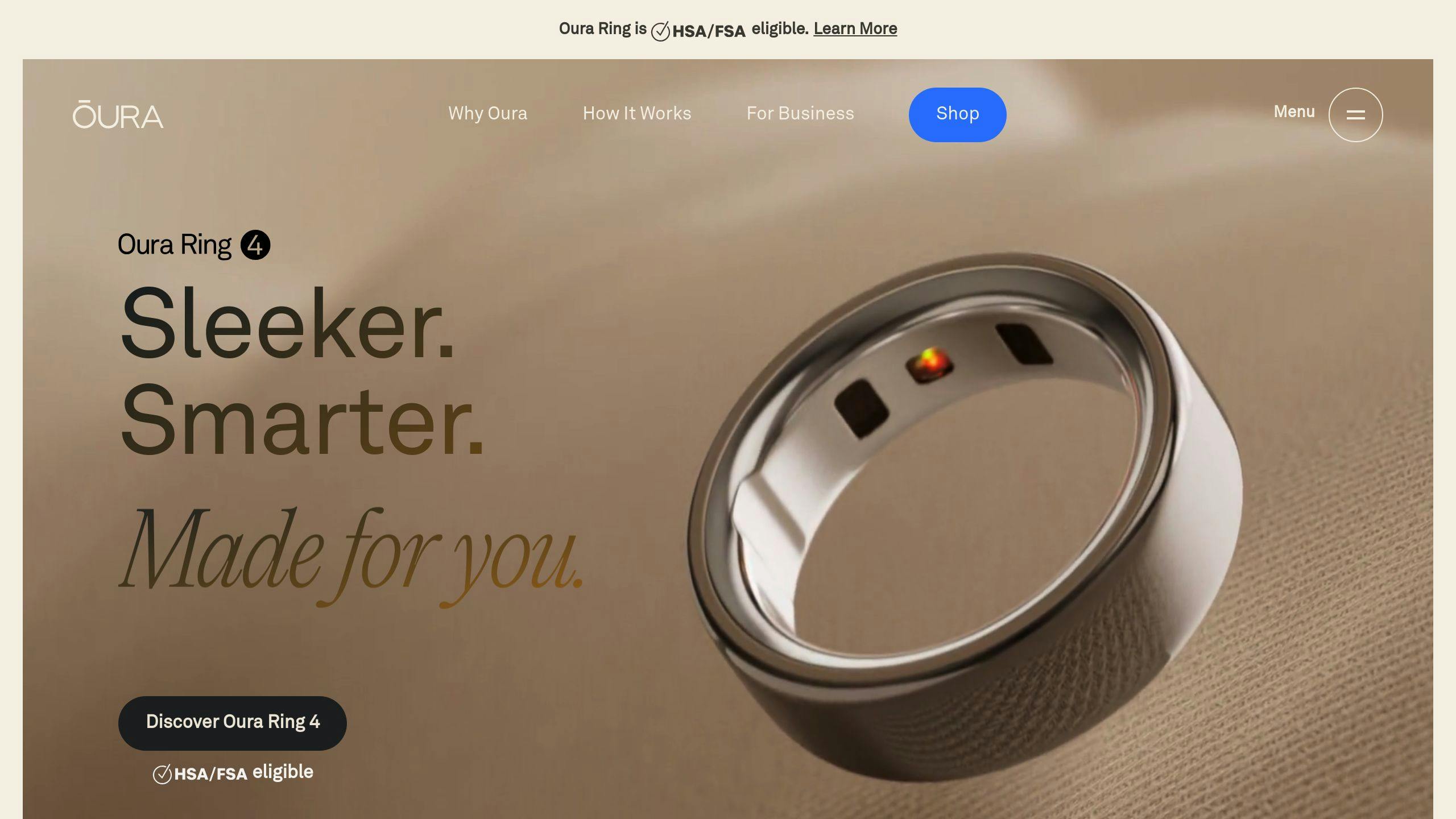
The Oura Ring Gen 3 is shaking up the health gadget scene in 2024. This tiny smart ring is a powerhouse of health and sleep tracking.
Always-On Health Tracking
The Oura Ring Gen 3 is built for non-stop wear. It's light, water-resistant, and so comfy you might forget it's there. But don't be fooled by its size - this little ring is always working, taking 70,000 measurements every day. That's one reading every second, giving you a super detailed health snapshot.
Sleep Tracking Champ
When it comes to tracking sleep, the Oura Ring Gen 3 is top-notch. A University of Tokyo study found its Sleep Staging Algorithm 2.0 had a 94.8% match with polysomnography (PSG), the gold standard for sleep studies.
"The Oura Ring's sensors pack heart rate, HRV, temperature, activity, and sleep monitoring tech into a ring you'll forget is there but never want to take off." - Jason Russell, Oura's Senior Director of Product.
Every morning, you get a Sleep Score from 0 to 100, showing your sleep quality at a glance. The Oura app also breaks down your sleep stages, including REM, deep sleep, and light sleep.
More Than Just Sleep
The Oura Ring Gen 3 doesn't just count sheep. It tracks:
-
Heart rate and heart rate variability
-
Breathing rate
-
Body temperature
-
Blood oxygen levels
-
Activity levels
This data creates your daily Readiness Score, showing how ready your body is for the day. Had a bad night? The Oura might suggest easy yoga instead of that tough workout you planned.
Real-Life Uses
The Oura Ring Gen 3 helps you make smarter health choices:
-
It can predict periods by tracking body temperature
-
It alerts you to stress by monitoring heart rate variability
-
It helps balance exercise and recovery with the Activity Score
The Cost of Quality
The Oura Ring Gen 3 isn't cheap. It starts at $299 for the Heritage design and $349 for the Horizon design. There's also a $5.99 monthly fee after the first month for full features.
Is it worth it? If you're serious about understanding your health, the Oura Ring Gen 3 offers insights that are hard to beat. Its subtle design and thorough tracking make it stand out for those who want constant health monitoring without a bulky smartwatch.
In the health gadget world, the Oura Ring Gen 3 shows that great things can come in small packages. As we focus more on health and wellness in 2024, this tiny powerhouse is one to watch - or rather, to wear.

The Whoop 4.0 is shaking up the 2024 health gadget world. It's not your typical smartwatch. This sleek, screenless fitness tracker is laser-focused on three things: sleep, strain, and recovery.
24/7 Health Tracking
Whoop 4.0 doesn't take breaks. It's always on, always watching. It checks your heart rate 100 times every second. That's a lot of data. But it doesn't stop there. It also keeps tabs on:
-
Your blood oxygen
-
How hot (or cold) your skin is
-
How fast you're breathing
-
Your heart rate variability (HRV)
All this data paints a detailed picture of your health over time.
Recovery and Strain: Your Daily Health Scores
Every day, Whoop gives you two important numbers:
-
Recovery Score (0-100%): This tells you how ready your body is for action. It looks at things like your HRV, how well you slept, and your resting heart rate.
-
Strain Score (1-21): This shows how much stress your body's under. It helps you decide if you should go hard at the gym or take it easy.
David Morton from Men's Health says:
"If you can justify the cost and remain mindful to make sensible actions based off the data it provides, it's a fantastic wearable for accessing elite-level health and fitness insights that can truly elevate your training, sleep and recovery."
Sleep Coach and Health Journal
Whoop doesn't just track your sleep. It tells you when to hit the hay based on your goals. It even keeps track of your "sleep debt" to help you catch up on missed Z's.
The Whoop Journal is a quick daily check-in. In just 10 seconds, you can log 140 different behaviors. This helps you spot connections between what you do and how your body responds.
What It Costs and How Long It Lasts
Whoop works on a subscription:
| How Long | How Much | | --- | --- | | 1 year | $239 ($20/month) | | 2 years | $399 ($16/month) |
The battery keeps going for 4-5 days. And you can charge it without taking it off, so you never miss a beat.
Is Whoop 4.0 For You?
If you're serious about fitness and want to dial in your training and recovery, Whoop 4.0 might be your new best friend. It's not about counting steps. It's about understanding your body over time.
But heads up: Whoop doesn't have some things you might expect, like GPS or a screen for quick data checks. It's built for people who care more about deep health insights than smartwatch bells and whistles.
In 2024, as we all get more interested in our health data, Whoop 4.0 offers a fresh take on wellness tracking. By focusing on recovery and strain, it helps you make smarter choices about your day-to-day life. And that could lead to better performance and health overall.
Blood sugar monitoring has gotten a lot better in 2024. New devices make it easier for people with diabetes to keep an eye on their glucose levels. Let's check out some of the top options this year.
CGMs: The New Big Thing
Continuous Glucose Monitors (CGMs) are changing the game. They give you real-time glucose data without having to prick your finger all the time. Two devices are really making a splash:
-
FreeStyle Libre 3: This tiny arm sensor sends glucose readings to your phone every minute. It lasts 14 days and has a 7.9% accuracy score (MARD).
-
Dexcom G7: This one warms up in just 30 minutes, updates every 5 minutes, and lasts 10 days. It's way smaller than the old version and lets you set custom alerts.
Here's how they stack up:
| Feature | FreeStyle Libre 3 | Dexcom G7 | | --- | --- | --- | | Sensor Life | 14 days | 10 days | | Data Updates | Every minute | Every 5 minutes | | Warm-up Time | 60 minutes | 30 minutes | | MARD (Accuracy) | 7.9% | 8.2% | | Size | Smallest available | 60% smaller than G6 |
What's Coming Next?
While CGMs are hot right now, some cool new tech is in the works:
BOYDSense is working on "Lassie", a device that checks glucose levels in your breath. They're testing it out in France.
RSP Systems is developing a touch glucose monitor that uses light to measure glucose through your skin. No needles needed!
Picking the Right Device
When you're choosing a blood sugar tracker, think about:
-
How accurate it is (lower MARD scores are better)
-
How easy it is to use (sensor life, warm-up time, data display)
-
How much it costs (CGMs are about $100 a month without insurance)
"CGMs give you the info you need to make smart choices. Food affects everyone differently." - Mahmood Kazemi, Chief Medical Officer at Abbott's diabetes care division.
These new devices are making it easier than ever to keep tabs on blood sugar. Whether you go for a CGM or wait for the next big thing, there are more options than ever to help manage diabetes.
Health tracking rings are taking the wellness tech world by storm in 2024. These tiny devices pack a punch, offering a discreet alternative to bulky smartwatches. Let's check out the top contenders this year.
Oura Ring 4: Still on Top
The Oura Ring 4 keeps its crown, improving on what made it great. This titanium ring now tracks over 50 health metrics, including:
-
Sleep stages and quality
-
Heart rate and variability
-
Body temperature
-
Activity levels
-
Stress indicators
The Oura 4's new Smart Sensing tech boosts data accuracy no matter how you wear it. And with up to 8 days of battery life, you won't be scrambling for a charger.
"The Oura Ring 4 is a great smart ring for those who want to keep close tabs on their health. But it comes at a price: $349-$499 for the ring, plus $70 per year for full access." - Nirave Gondhia, Technology Journalist
Is it worth it? For many, the depth of data justifies the cost.
RingConn Gen 2: Budget-Friendly Option
Want to save some cash? The RingConn Gen 2 might be your best bet. At $299, it offers solid features without a subscription:
-
10-12 day battery life
-
Ultra-light design (2-3 grams)
-
Water resistance up to 50 meters
-
Sleep apnea detection
The app isn't as slick as Oura's, but it's a good choice for health tracking newbies.
Samsung Galaxy Ring: For the Android Crowd
Samsung's $399 smart ring is turning heads, especially among Android users. Key features:
-
Strong sleep tracking and coaching
-
7-day battery life
-
Portable charging case
It might not dive as deep as Oura, but it plays nice with other Samsung devices.
Ultrahuman Ring Air: No Strings Attached
Tired of monthly fees? The Ultrahuman Ring Air offers a one-time $349 price tag with:
-
Comprehensive sleep and recovery tracking
-
No ongoing subscription costs
-
Lightweight design (3.6 grams)
But it lags behind in women's health tracking.
Here's how they stack up:
| Feature | Oura Ring 4 | RingConn Gen 2 | Samsung Galaxy Ring | Ultrahuman Ring Air | | --- | --- | --- | --- | --- | | Weight | 4-6g | 2-3g | 2.3g | 3.6g | | Battery Life | Up to 8 days | 10-12 days | Up to 7 days | Not specified | | Water Resistance | 100m | 50m | 100m | 100m | | Subscription | $5.99/month | None | None | None | | Price | $349 | $299 | $399 | $349 |
These health tracking rings prove that big things come in small packages. Whether you're a fitness buff, sleep-tracker, or just health-curious, there's a ring for you. Pick the one that fits your finger, lifestyle, and wallet. And remember: the best health gadget is the one you'll actually use.
Health gadgets in 2024 pack a punch with diverse features and price tags. Let's dive into the key players:
Apple Watch Series 9 ($399) is the iPhone user's dream:
-
Sleep apnea detection (coming soon)
-
ECG app
-
Fall and crash detection
-
18-hour battery (36 hours in low power mode)
Garmin Venu 3 ($449.99) brings the heat:
-
14-day battery life
-
Built-in GPS
-
Sleep tracking and coaching
-
Bright AMOLED touchscreen
Android fans, meet the Samsung Galaxy Ring ($399):
-
Sleep tracking
-
7-day battery life
-
Portable charging case
Fitbit Charge 6 ($159.95) doesn't mess around:
-
Built-in GPS
-
7-day battery life
-
ECG capabilities
-
Google Wallet integration
On a budget? The Amazfit Band 7 (under $50) has you covered:
-
12-28 day battery life
-
1.5-inch AMOLED display
-
Basic fitness tracking
The Oura Ring Gen3 ($299-$549) is small but mighty:
-
Sleep stage tracking
-
Body temperature monitoring
-
7-day battery life
-
$5.99 monthly subscription
Whoop 4.0 is all business:
-
Subscription-based ($30/month)
-
Recovery and strain tracking
-
No screen (zero distractions)
Let's break it down:
| Device | Battery Life | GPS | Touchscreen | Price | | --- | --- | --- | --- | --- | | Apple Watch Series 9 | 18 hours | Yes | Yes | $399 | | Garmin Venu 3 | 14 days | Yes | Yes | $449.99 | | Fitbit Charge 6 | 7 days | Yes | Yes | $159.95 | | Oura Ring Gen3 | 7 days | No | No | $299-$549 | | Whoop 4.0 | 4-5 days | No | No | $30/month |
Picking your perfect health gadget? Think about what you REALLY need. Want it all? Go for a smartwatch. Obsessed with sleep and recovery? The Oura Ring or Whoop 4.0 might be your jam. Watching your wallet? The Fitbit Charge 6 or Amazfit Band 7 could be right up your alley.
Health gadgets have come a long way. They're not just fancy step counters anymore - they're your personal health buddies. Let's break down what we've learned:
Smartwatches: The Swiss Army Knives of Health Tech
The Apple Watch Series 9 ($399) and Garmin Venu 3 ($449.99) are the big players here. They're pricey, but they pack a punch:
-
Apple Watch Series 9: Detects sleep apnea, does ECGs, and even knows if you've crashed
-
Garmin Venu 3: Lasts two weeks on a charge and has built-in GPS
Fitness Trackers: For the Budget-Conscious
Don't want to break the bank? Check out the Fitbit Charge 6 ($159.95) or the Amazfit Band 7 (under $50). They'll track your steps without emptying your wallet.
Smart Rings: Tiny but Mighty
The Oura Ring Gen3 ($299-$549) is like a fitness tracker, but for your finger. It tracks sleep and body temp in a package small enough to wear 24/7.
For the Hardcore Athletes
The Whoop 4.0 ($30/month) is all about recovery and strain. It's perfect if you're serious about your training.
When picking your health gadget, think about:
1. What you want to track (sleep, workouts, health stats?)
2. How often you're willing to charge it
3. Which features you'll actually use (don't pay for bells and whistles you'll ignore)
4. If it plays nice with your other tech
The best health gadget? It's the one you'll actually use. Don't get sucked in by fancy features if they don't fit your life.
"Fitness trackers are incredibly personal. Sure, they have to be comfortable and attractive, but they also must fit your lifestyle, as well as when and how you like to work out." - Adrienne So, Senior Associate Reviews Editor, WIRED.
Adrienne's got it right. Your health gadget should feel like it belongs in your life, not like it's crashing the party.
Looking ahead, health gadgets are getting smarter, more accurate, and more personalized. Whether you're a gym rat or just trying to stay healthy, there's a gadget out there for you.
Find the sweet spot between features, usability, and your health goals. With the right gadget on your side, you're set to make 2024 your healthiest year yet.
Garmin's Vivomove Sport Watch takes the crown for accuracy in wearable health gadgets. WIRED's recent review named it the top pick, praising its precision, comfort, and ease of use.
Here's why the Vivomove Sport Watch stands out:
It nails key health metrics like step count, calories burned, and sleep duration. These measurements? They're "spot on."
But let's get real: even the best wearables aren't perfect.
-
Heart rate tracking: usually within 3% accuracy
-
Step counting: tends to undercount by about 9%
-
Energy expenditure: can swing between -21.27% to 14.76%
-
Sleep tracking: often overestimates total sleep time by more than 10%
"Focus on doing the exercise. Worry less about measuring it, because the actual exercise is often more valuable than the numbers on the screen." - Linda Lee, MD, Cardiologist
Dr. Lee's got a point. Sure, accuracy matters. But the big picture? It's about trends and consistency in your health data.
If you're eyeing a wearable health device, remember:
1. Consistency is key. Wear it as recommended.
2. Do a reality check. Compare step counts to known distances now and then.
3. Take calorie and sleep data with a grain of salt. They're estimates, not gospel.
Bottom line? Wearables are tools, not magic. Use them to track progress, but don't let the numbers rule your life.